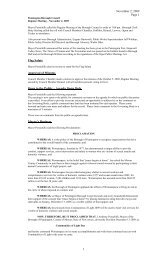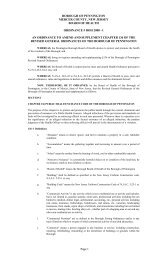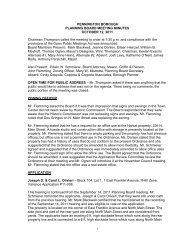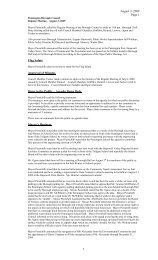Lyme & other Tick Borne diseases brochure
Lyme & other Tick Borne diseases brochure
Lyme & other Tick Borne diseases brochure
You also want an ePaper? Increase the reach of your titles
YUMPU automatically turns print PDFs into web optimized ePapers that Google loves.
How can tick-borne <strong>diseases</strong><br />
be prevented<br />
❖<br />
❖<br />
Perform <strong>Tick</strong> Checks:<br />
1. Remove ticks from your clothes before<br />
going indoors.<br />
2. Wash your clothes with hot water and<br />
dry them using high heat for at least one<br />
hour.<br />
3. Perform a daily tick check after being<br />
outdoors. Inspect all parts of your body,<br />
including your armpits, scalp, and groin.<br />
Safely remove any found ticks:<br />
1. Use fine-tipped tweezers.<br />
2. Grab the tick close to the skin. Do not<br />
twist or jerk the tick, as this may cause<br />
the mouthparts to break off and remain<br />
in the skin.<br />
3. With a steady motion, gently pull<br />
straight up until all parts of the tick are<br />
removed.<br />
4. After removing the tick, clean your skin<br />
with soap and warm water.<br />
5. Contact your healthcare provider if you<br />
develop any symptoms.<br />
Where can I find more<br />
information about tick-borne<br />
disease<br />
NJDHSS Communicable<br />
Disease Service<br />
http://www.nj.gov/health/cd/<br />
CDC <strong>Tick</strong>-<strong>Borne</strong> Diseases<br />
http://www.cdc.gov/ticks/<strong>diseases</strong>/<br />
CDC Updates on Mosquito Repellent<br />
http://www.cdc.gov/ncidod/dvbid/<br />
westnile/RepellentUpdates.htm<br />
<strong>Tick</strong>-<strong>Borne</strong><br />
DISEASES<br />
❖<br />
Do not use petroleum jelly, hot matches,<br />
nail polish remover or <strong>other</strong> products to<br />
remove a tick.<br />
New Jersey Department of<br />
Health & Senior Services<br />
Public Health Services Branch<br />
Communicable Disease Service<br />
PO Box 369<br />
Trenton, NJ 08625<br />
Phone: 609-826-4872<br />
Feb 2010<br />
C1490
What are tick-borne <strong>diseases</strong><br />
<strong>Tick</strong>-borne <strong>diseases</strong> are bacterial illnesses that<br />
spread to humans through infected ticks. The<br />
most common tick-borne <strong>diseases</strong> in<br />
New Jersey are:<br />
❖ <strong>Lyme</strong> disease<br />
❖ Ehrlichiosis<br />
❖ Anaplasmosis<br />
❖ Rocky Mt. spotted fever<br />
❖ Babesiosis<br />
How do tick-borne <strong>diseases</strong><br />
spread<br />
<strong>Tick</strong>-borne <strong>diseases</strong> are not spread between two<br />
people, but rather rely on ticks for transmission.<br />
<strong>Tick</strong>s become infected by micro-organisms<br />
(bacteria or protozoan parasites) when feeding<br />
on small infected mammals (e.g. mice and<br />
voles). Different tick-borne <strong>diseases</strong> are caused<br />
by different micro-organisms and it is possible<br />
to be infected with more than one tick-borne<br />
disease at the same time.<br />
These are the ticks in New Jersey that may<br />
carry disease causing micro-organisms:<br />
❖ Black-legged “deer” tick (Ixodes scapularis)<br />
❖ Lone star tick (Amblyomma americanum)<br />
❖ American dog tick (Dermacentor variabilis)<br />
T I C K - B O R N E D I S E A S E S<br />
What are the symptoms of<br />
tick-borne <strong>diseases</strong><br />
The early signs of tick-borne <strong>diseases</strong> generally<br />
include:<br />
❖ Skin rash<br />
❖ General tiredness<br />
❖ Fever and/or chills<br />
❖ Headache<br />
❖ Stiff neck<br />
❖ Muscle aches<br />
❖ Joint pain<br />
❖ Dizziness<br />
How soon after a tick bite do<br />
symptoms occur<br />
<strong>Lyme</strong> disease<br />
Ehrlichiosis<br />
Anaplasmosis<br />
Rocky Mt. spotted fever<br />
Babesiosis<br />
3-30 days<br />
5-10 days<br />
5-21 days<br />
5-10 days<br />
7-56 days<br />
How are tick-borne <strong>diseases</strong><br />
diagnosed<br />
Most tick-borne <strong>diseases</strong> are diagnosed through<br />
blood tests and by discussing symptoms with a<br />
healthcare provider.<br />
How can tick-borne <strong>diseases</strong><br />
be prevented<br />
❖<br />
❖<br />
❖<br />
❖<br />
❖<br />
❖<br />
❖<br />
❖<br />
Avoid wooded areas with dense shrubs, high<br />
grass, and a lot of leaves, as these are places<br />
where ticks are likely to hide.<br />
If you hike in the woods, stay to the center<br />
of the trail to avoid overgrown vegetation.<br />
Take extra precautions in May, June, and<br />
July when ticks that transmit disease are<br />
most active.<br />
Make your yard less attractive to ticks: mow<br />
lawns, clear brush, and remove leaf litter.<br />
Keep ground under bird feeders clean.<br />
Keep playground equipment, decks, and<br />
patios away from yard edges and trees.<br />
When outdoors, apply EPA-registered insect<br />
repellent on exposed skin and clothing<br />
according to the instructions on the product<br />
label. DEET may be used on skin and<br />
Permethrin should only be used on clothing<br />
and outdoor gear.<br />
Cover up. Wear long, solid, and lightcolored<br />
clothing with pants tucked into<br />
socks. This will help prevent ticks from<br />
getting under your clothes and attaching to<br />
your skin.<br />
Black-legged<br />
“deer” tick<br />
Lone star tick<br />
Who gets tick-borne<br />
<strong>diseases</strong><br />
American dog<br />
tick<br />
Anyone who is bitten by an infected tick may<br />
get a tick-borne disease. People who spend a lot<br />
of time outdoors have a greater risk of<br />
becoming infected.<br />
What is the treatment for<br />
tick-borne <strong>diseases</strong><br />
<strong>Tick</strong>-borne <strong>diseases</strong> caused by bacteria (<strong>Lyme</strong><br />
disease, ehrlichiosis, anaplasmosis, and Rocky<br />
Mt. spotted fever) can be treated with<br />
antibiotics. Babesiosis is caused by a parasite<br />
similar to malaria, and is treated with antiprotozoal<br />
drugs. It is important to watch for<br />
symptoms and talk to your healthcare provider<br />
if you’ve been bitten by a tick. Early treatment<br />
can be very effective.






